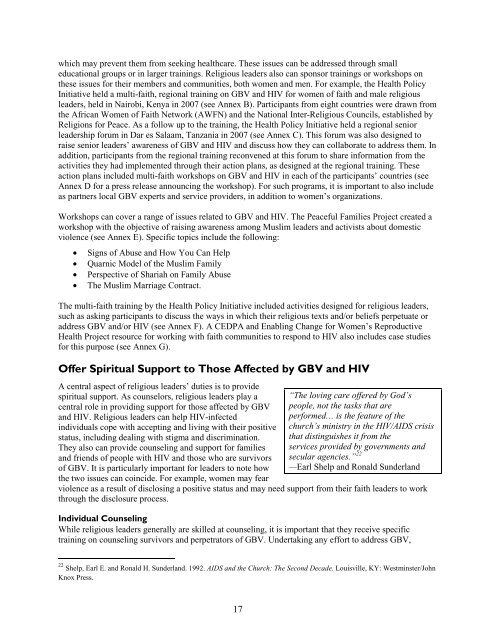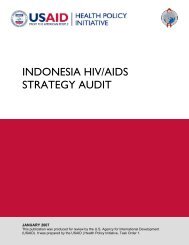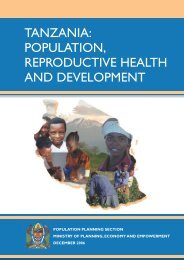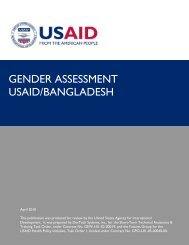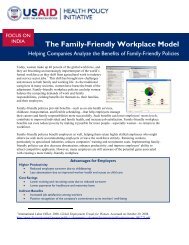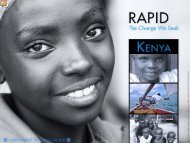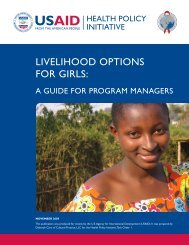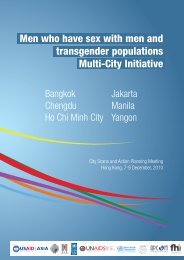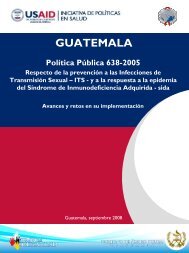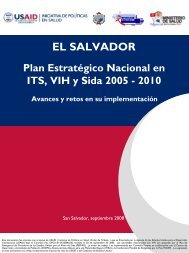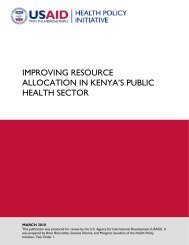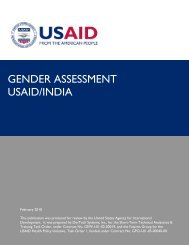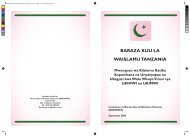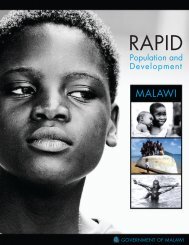A Call to Act - Health Policy Initiative
A Call to Act - Health Policy Initiative
A Call to Act - Health Policy Initiative
Create successful ePaper yourself
Turn your PDF publications into a flip-book with our unique Google optimized e-Paper software.
which may prevent them from seeking healthcare. These issues can be addressed through small<br />
educational groups or in larger trainings. Religious leaders also can sponsor trainings or workshops on<br />
these issues for their members and communities, both women and men. For example, the <strong>Health</strong> <strong>Policy</strong><br />
<strong>Initiative</strong> held a multi-faith, regional training on GBV and HIV for women of faith and male religious<br />
leaders, held in Nairobi, Kenya in 2007 (see Annex B). Participants from eight countries were drawn from<br />
the African Women of Faith Network (AWFN) and the National Inter-Religious Councils, established by<br />
Religions for Peace. As a follow up <strong>to</strong> the training, the <strong>Health</strong> <strong>Policy</strong> <strong>Initiative</strong> held a regional senior<br />
leadership forum in Dar es Salaam, Tanzania in 2007 (see Annex C). This forum was also designed <strong>to</strong><br />
raise senior leaders’ awareness of GBV and HIV and discuss how they can collaborate <strong>to</strong> address them. In<br />
addition, participants from the regional training reconvened at this forum <strong>to</strong> share information from the<br />
activities they had implemented through their action plans, as designed at the regional training. These<br />
action plans included multi-faith workshops on GBV and HIV in each of the participants’ countries (see<br />
Annex D for a press release announcing the workshop). For such programs, it is important <strong>to</strong> also include<br />
as partners local GBV experts and service providers, in addition <strong>to</strong> women’s organizations.<br />
Workshops can cover a range of issues related <strong>to</strong> GBV and HIV. The Peaceful Families Project created a<br />
workshop with the objective of raising awareness among Muslim leaders and activists about domestic<br />
violence (see Annex E). Specific <strong>to</strong>pics include the following:<br />
• Signs of Abuse and How You Can Help<br />
• Quarnic Model of the Muslim Family<br />
• Perspective of Shariah on Family Abuse<br />
• The Muslim Marriage Contract.<br />
The multi-faith training by the <strong>Health</strong> <strong>Policy</strong> <strong>Initiative</strong> included activities designed for religious leaders,<br />
such as asking participants <strong>to</strong> discuss the ways in which their religious texts and/or beliefs perpetuate or<br />
address GBV and/or HIV (see Annex F). A CEDPA and Enabling Change for Women’s Reproductive<br />
<strong>Health</strong> Project resource for working with faith communities <strong>to</strong> respond <strong>to</strong> HIV also includes case studies<br />
for this purpose (see Annex G).<br />
Offer Spiritual Support <strong>to</strong> Those Affected by GBV and HIV<br />
A central aspect of religious leaders’ duties is <strong>to</strong> provide<br />
spiritual support. As counselors, religious leaders play a “The loving care offered by God’s<br />
central role in providing support for those affected by GBV people, not the tasks that are<br />
and HIV. Religious leaders can help HIV-infected<br />
performed… is the feature of the<br />
individuals cope with accepting and living with their positive church’s ministry in the HIV/AIDS crisis<br />
status, including dealing with stigma and discrimination. that distinguishes it from the<br />
They also can provide counseling and support for families services provided by governments and<br />
and friends of people with HIV and those who are survivors secular agencies.” 22<br />
of GBV. It is particularly important for leaders <strong>to</strong> note how —Earl Shelp and Ronald Sunderland<br />
the two issues can coincide. For example, women may fear<br />
violence as a result of disclosing a positive status and may need support from their faith leaders <strong>to</strong> work<br />
through the disclosure process.<br />
Individual Counseling<br />
While religious leaders generally are skilled at counseling, it is important that they receive specific<br />
training on counseling survivors and perpetra<strong>to</strong>rs of GBV. Undertaking any effort <strong>to</strong> address GBV,<br />
22 Shelp, Earl E. and Ronald H. Sunderland. 1992. AIDS and the Church: The Second Decade. Louisville, KY: Westminster/John<br />
Knox Press.<br />
17


